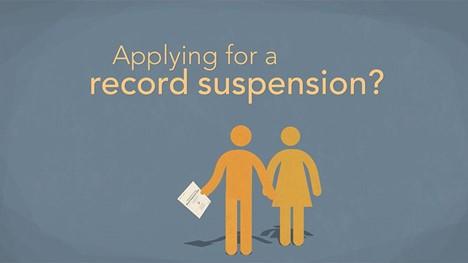How Does a Criminal Record Suspension Work?
A Criminal Record Suspension, also known as probation, allows a criminal to be allowed to have their criminal convictions hidden from standard background checks. With a criminal record, they can hold you down far longer than you may have realized. They can even impede your future, traveling plans, schooling, volunteering and so much more. You can get your criminal suspension record resolved by consulting with pardon applications.

Types of Record Suspensions in Canada
There are many different types of criminal record suspensions. The most common is called a deferred entry into the country, or deportation. Deferred entry permits an individual to remain in the country while waiting to be removed from the country. Each of these has different requirements and can last anywhere from ten years to twenty years.
Another type of criminal record suspension in which Canadians can apply is called Canadians inadmissible to Canada. This type of suspension applies when an individual has been previously convicted of a crime in another country. These applications are processed at the same time as permanent resident applications.
While many of the crimes that result in a criminal record suspension are serious, others are less serious. For example, traffic violations and minor offenses can lead to deportation. However, if a Canadian citizen has been previously convicted of Canada's Controlled Drugs and Substances Act, a criminal conviction will remain on their record. This type of infraction does not require actual consumption of drugs in order to be considered a drug dealer. If Canadian wishes to apply for citizenship or to remove their criminal record, they must apply with the local immigration office in their own country. When applying through the Canadian Immigration Process, there are specific documents required.
There are also times when Canadian authorities find that a crime they were convicted of did not actually occur in Canada. When this is the case, criminal record suspensions that have occurred outside of Canada will be removed from the individual's file. This means that their status as a citizen of Canada will be restored, but their criminal record suspension will still exist. If they wish to be granted citizenship again, they must apply with the immigration office in their own country.
Record Suspensions outside Canada
Criminal record suspensions that have occurred outside of Canada may lead to removal of Canadian citizenship if there is no chance that the individual can make good conduct parole in the future. Convicted criminals who face sentencing will have to serve their time in jail unless they are granted good conduct parole. Convicted criminal offenders who cannot meet this requirement and who are not granted good conduct parole may face criminal charges and sentencing at the same time as other individuals who are allowed to make good conduct parole.
To find out if one has been convicted of a crime outside of Canada, they need to access the RCMP database. Once they have access to the database, they will be able to see if any convictions that they are involved in have been recalled. If so, they will need to present documentation proving their innocence to the Canadian authorities in order to have their criminal record suspension lifted.
In addition to criminal records in other countries, individuals can also access their own criminal records if they have access to their own copy of a police report. Canadian law enforcement agencies store arrest warrants and court records on all individuals who are registered with them. When applying for Canadian citizenship, an immigrant who was convicted of a crime in another country will need to provide proof of not being a criminal. The only way to obtain proof of innocence is to visit the courthouse where the offense occurred and provide evidence through original documents that are signed by the accused notarized.
More to Read:
Previous Posts:










